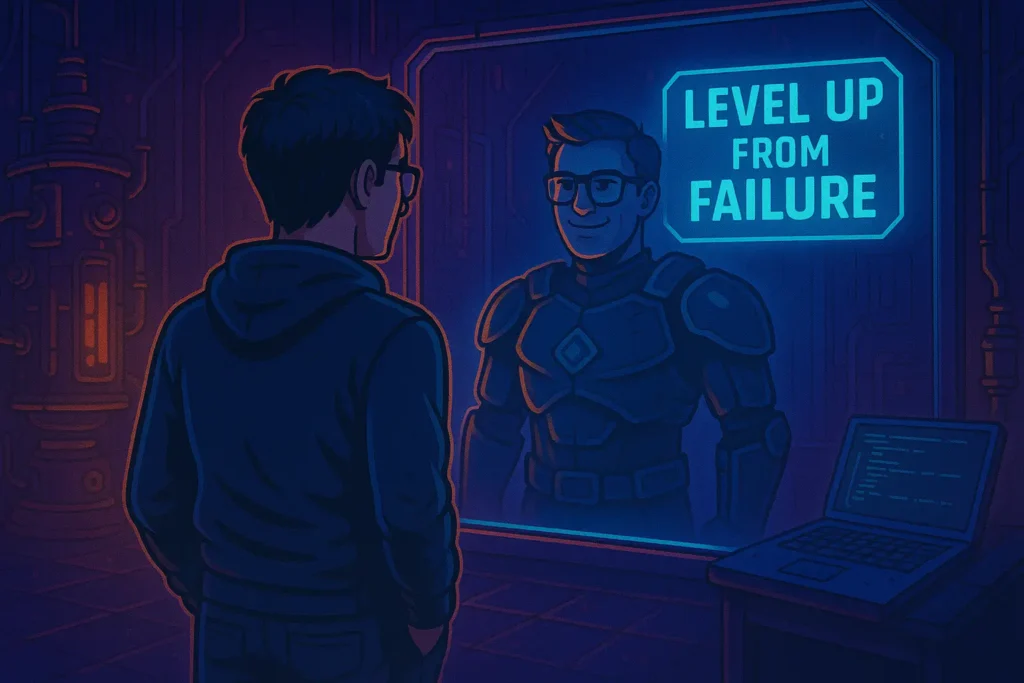The notification pinged at exactly 2:47 PM on a Tuesday. “We’ve decided to move forward with another candidate.” I stared at my phone screen in the middle of a crowded coffee shop, watching strangers laugh and chat around me while my world crumbled in 12 simple words. This was the seventh rejection in three months, and suddenly the question “why do I feel like a failure” wasn’t just a passing thought – it was a deafening roar drowning out everything else.
The irony hit me as I scrolled through LinkedIn, watching former classmates announce new achievements while I crafted another cover letter for a job I wasn’t even excited about. Here I was, a person who had graduated with honors, volunteered at animal shelters, helped friends through their darkest moments, and learned three languages – yet somehow convinced myself I was a complete failure because of some rejection emails.
That’s when it struck me: failure isn’t what happens to you. It’s the story you tell yourself about what happened.
The most successful people I knew had been rejected, fired, dumped, and disappointed just as much as anyone else. The difference wasn’t their circumstances – it was their relationship with setbacks. They had somehow learned to separate temporary disappointments from permanent identity, to see closed doors as redirections rather than reflections of their worth.
If you’re reading this while wrestling with thoughts like “I am a failure” or wondering why everyone else seems to have it figured out, I want you to know something: that feeling in your chest isn’t truth – it’s just a very convincing lie your brain tells you to keep you safe from taking risks.
What You’ll Learn From This Blog
In this comprehensive guide, you’ll discover three key insights to transform your relationship with failure:
- The psychological roots behind why do I feel like a failure – Understanding the cognitive patterns, social influences, and past experiences that create these feelings, helping you recognize that these thoughts are often based on distorted perceptions rather than reality.
- Evidence-based strategies for overcoming failure-related thoughts – Practical techniques including cognitive restructuring, self-compassion practices, and resilience-building methods that have been proven effective in psychological research.
- Modern AI-powered tools and digital solutions – Innovative approaches using artificial intelligence, apps, and technology to support mental health, track progress, and provide personalized guidance for managing self-doubt and building confidence.
Understanding ‘Why Do I You Feel Like a Failure’
When you find yourself thinking “I feel like a failure,” it’s important to recognize that these feelings are often more about perception than reality. The human brain has evolved to focus on threats and negative experiences as a survival mechanism, which means we naturally pay more attention to our shortcomings than our successes.
Several psychological factors contribute to feeling like a failure. Perfectionism plays a significant role, setting impossibly high standards that no one could reasonably meet. Social comparison, amplified by social media, creates an illusion that everyone else is more successful, happier, or more accomplished. Additionally, past experiences of criticism or rejection can create lasting patterns of self-doubt.
The modern world exacerbates these feelings through constant pressure to achieve and succeed. Career expectations, financial pressures, social media comparisons, and cultural messages about success all contribute to an environment where many people regularly question their worth and accomplishments.
Common Triggers That Make You Feel Like a Failure
Understanding why do I feel like a failure often starts with identifying specific triggers. Work-related setbacks are among the most common catalysts. Missing a promotion, receiving negative feedback, or struggling with job performance can trigger intense feelings of inadequacy. These professional disappointments often feel like reflections of personal worth rather than isolated incidents.
Relationship challenges also frequently trigger these feelings. Divorce, breakups, conflicts with family members, or social rejection can make someone think “why am I such a failure” in their personal connections. The end of a significant relationship often brings self-blame and questions about one’s ability to maintain meaningful bonds.
Financial struggles represent another major trigger. Job loss, debt, inability to meet financial goals, or comparing one’s economic situation to others can create overwhelming feelings of personal failure. Money problems often feel like direct reflections of one’s competence and value as a person.
Read More: What Makes Life Worth Living
The Psychology Behind Feeling Like a Failure
The statement “I am a failure” reflects cognitive distortions that psychologists have studied extensively. These thought patterns include all-or-nothing thinking, where any setback is viewed as complete failure, and catastrophizing, where minor problems are seen as major disasters.
Negative self-talk plays a crucial role in maintaining these feelings. The internal voice that constantly criticizes and judges creates a cycle where temporary setbacks become permanent character flaws. This inner critic often uses harsh language that would never be directed toward a friend or loved one.
Imposter syndrome frequently underlies feeling like a failure, particularly among high achievers. Despite evidence of competence and success, individuals with imposter syndrome believe they’re frauds who will eventually be exposed. This creates constant anxiety and self-doubt that can make any mistake feel like proof of incompetence.
Learned helplessness, developed through repeated experiences of perceived failure, can create a mindset where individuals believe they have no control over outcomes. This psychological state makes it difficult to recognize personal agency and the ability to influence future results.
How Past Experiences Shape Current Feelings
Childhood experiences significantly influence adult feelings of failure. Critical parents, demanding teachers, or competitive environments can create lasting beliefs about self-worth being tied to performance. Children who grew up with conditional love – receiving affection only when meeting certain standards – often carry these patterns into adulthood.
Traumatic experiences, whether major or minor, can create lasting impressions about personal capability. A humiliating experience in school, public failure, or significant rejection can become a reference point that colors future self-perception. These experiences often create core beliefs about being inadequate or unworthy of success.
Cultural and family messages about success also shape how individuals interpret their experiences. Families that emphasize achievement over effort, or cultures that define worth through external accomplishments, can create unrealistic standards for self-evaluation.
Read More: 7 Habits of Happy Kids
The Impact of Social Media and Comparison Culture
Modern technology has amplified the tendency to feel like a failure through constant exposure to others’ highlight reels. Social media platforms showcase carefully curated versions of people’s lives, creating an illusion that everyone else is more successful, happier, or more fulfilled.
This comparison culture makes the question “why do I feel like a failure” more prevalent than ever. Seeing former classmates’ promotions, friends’ vacation photos, or influencers’ lifestyle content can trigger immediate feelings of inadequacy. The brain struggles to remember that these representations aren’t complete pictures of reality.
The speed of information in digital culture also creates pressure for immediate success. Stories of young entrepreneurs or overnight successes can make normal career progression feel inadequate. This accelerated timeline for achievement can make anyone feel behind or unsuccessful by comparison.
Read our blog Scrolling Addiction
How to Not Feel Like a Failure: Practical Strategies
Learning how to not feel like a failure requires intentional effort and patience with yourself. The following evidence-based strategies can help transform your relationship with setbacks and build lasting confidence.
Challenge Negative Thought Patterns Through Cognitive Restructuring
The first step involves recognizing and challenging the automatic thoughts that fuel failure feelings. When you notice thoughts like “I am a failure,” pause and examine the evidence objectively. Ask yourself: Would I judge a friend as harshly for the same situation? What would I tell someone I care about who was facing this challenge?
Create a thought record by writing down the negative thought, identifying the emotion it creates, and then listing evidence for and against the thought. This process helps reveal how distorted thinking patterns contribute to feeling like a failure, allowing you to develop more balanced perspectives.
Practice the “best friend test” whenever self-criticism emerges. If you wouldn’t say something to your best friend, don’t say it to yourself. This simple technique can immediately reduce the harsh internal dialogue that reinforces failure feelings.
Read More: Abundance vs Scarcity Mindset
Develop Self-Compassion as Your Foundation
Self-compassion is crucial for overcoming feelings of failure. Treat yourself with the same kindness you would offer a good friend facing similar challenges. Recognize that failure and setbacks are universal human experiences, not personal character flaws that make you uniquely inadequate.
Dr. Kristin Neff’s research identifies three components of self-compassion: self-kindness (treating yourself gently), common humanity (recognizing that struggle is part of the human experience), and mindfulness (observing your thoughts and feelings without judgment).
When you catch yourself thinking “why am I such a failure,” try this self-compassion exercise: Place your hand on your heart, take a deep breath, and say, “This is a moment of suffering. Suffering is part of life. May I be kind to myself in this moment.”
Read More: How to Practice Self Love
Set Realistic Expectations and Celebrate Progress
Setting realistic expectations helps prevent the all-or-nothing thinking that contributes to feeling like a failure. Break large goals into smaller, manageable steps and celebrate progress rather than focusing solely on end results. This approach creates opportunities for success and builds confidence over time.
Use the SMART goal framework (Specific, Measurable, Achievable, Relevant, Time-bound) to set realistic objectives. Instead of “I want to be successful,” try “I will apply to three jobs this week” or “I will learn one new skill this month.”
Create a progress journal where you document small wins, lessons learned, and steps forward. This tangible record helps counter the tendency to dismiss achievements and provides evidence of growth during difficult periods.
Practice Gratitude to Shift Your Focus
Practicing gratitude regularly can shift focus from what’s lacking to what’s already present. Keep a daily gratitude journal or regularly reflect on achievements, relationships, and positive experiences. This practice helps balance the brain’s natural tendency to focus on problems and shortcomings.
Write down three things you’re grateful for each day, including at least one thing about yourself. This could be a personal strength, a kind action you took, or progress you made toward a goal. Over time, this practice rewires your brain to notice positive aspects of your life and character.
Use gratitude as an antidote to comparison. When you notice yourself comparing your life to others, immediately shift to appreciating something unique about your own journey or circumstances.
Related Article: Fun Gratitude Activities for Adults
Redefining Success and Personal Worth
Understanding why do I feel like a failure often reveals misaligned definitions of success. Society frequently equates worth with external achievements like wealth, status, or recognition. Developing personal definitions of success that include growth, relationships, contribution, and fulfillment creates more attainable and meaningful goals.
Consider success as a journey rather than a destination. Every experience, including failures, contributes to personal growth and wisdom. Reframing setbacks as learning opportunities rather than evidence of inadequacy changes the entire relationship with challenges.
Recognize that worth as a human being isn’t determined by achievements or failures. Inherent value exists regardless of performance, productivity, or external validation. This fundamental shift in perspective can dramatically reduce the power of failure-related thoughts.
AI-Powered Solutions: Why Do I Feel Like a Failure in the Digital Age
The integration of artificial intelligence in mental health support has opened new avenues for addressing the question “why do I feel like a failure.” Modern AI-powered tools offer personalized, accessible, and innovative approaches to understanding and overcoming feelings of inadequacy.
AI-Powered Mood Tracking and Pattern Recognition
Advanced AI applications can analyze your daily inputs about mood, thoughts, and circumstances to identify patterns that trigger failure-related feelings. Apps like Wysa, Replika, and Woebot use natural language processing to engage in supportive conversations while tracking emotional trends over time. These tools can help you recognize specific situations, times of day, or thought patterns that consistently lead to feeling like a failure.
Machine learning algorithms can identify subtle correlations between your environment, activities, and emotional states that might not be immediately obvious. For example, an AI system might notice that you consistently feel worse about yourself after scrolling social media in the evening, or that work-related stress on Mondays triggers broader feelings of inadequacy throughout the week.
Personalized Cognitive Behavioral Therapy (CBT) Through AI
AI-driven therapy platforms like MindShift, Sanvello, and Youper provide personalized cognitive behavioral therapy techniques specifically designed to address negative thought patterns. These apps can deliver customized exercises based on your specific triggers and thought distortions related to feeling like a failure.
The AI analyzes your responses to various prompts and situations, then suggests targeted interventions. When you input thoughts like “I am a failure,” the system can immediately provide cognitive restructuring exercises, evidence-gathering techniques, and alternative perspective prompts tailored to your specific situation and history.
Virtual Reality and Immersive Confidence Building
Emerging VR technologies offer immersive experiences designed to build confidence and resilience. Programs like Psious and AppliedVR create controlled environments where individuals can practice challenging situations, receive positive reinforcement, and gradually build self-efficacy without real-world consequences.
These platforms can simulate job interviews, public speaking scenarios, or social interactions where someone might typically think “why am I such a failure.” By providing safe spaces to practice and succeed, AI-powered VR helps rewire neural pathways associated with self-doubt and failure expectations.
The AI component learns from your responses and physiological feedback (heart rate, stress indicators) to adjust difficulty levels and provide optimal challenge progression. This personalized approach ensures that confidence-building exercises remain effective and appropriately challenging without becoming overwhelming.
Building Resilience and Moving Forward
Developing resilience is essential for anyone wondering how to not feel like a failure. Resilience involves bouncing back from setbacks and maintaining perspective during difficult times. This skill can be developed through practice and conscious effort.
Building a support network provides external perspective and encouragement during challenging periods. Surround yourself with people who see your worth beyond achievements and can offer realistic feedback about your capabilities and progress.
Focusing on effort rather than outcomes creates a sense of control and accomplishment. While results aren’t always within our control, the effort we put forth is. Celebrating hard work and dedication, regardless of outcomes, builds sustainable self-esteem.
Professional help from therapists or counselors can be invaluable for persistent feelings of failure. Mental health professionals can help identify underlying patterns, develop coping strategies, and work through past experiences that contribute to these feelings.
Conclusion: Why Do I feel Like a Failure
The question “why do I feel like a failure” reflects a common human struggle that affects people across all backgrounds and circumstances. These feelings often stem from unrealistic expectations, comparison culture, past experiences, and cognitive distortions rather than actual evidence of failure.
Overcoming these feelings requires patience, self-compassion, and intentional effort to change thought patterns and perspectives. Remember that feeling like a failure doesn’t make you one, and these feelings can be changed with the right approach and support.
Focus on growth rather than perfection, celebrate progress over outcomes, and remember that your worth as a person extends far beyond any single achievement or setback. With time and practice, it’s possible to develop a healthier relationship with success and failure while building genuine confidence and resilience.
🎮 LEVEL 1 COMPLETE— PRESS START TO BUILD REAL MOMENTUM
The mindset shifts and self-compassion techniques you just discovered? They’re core components of the Habits Coach AI – a gamified, AI-powered platform that makes transforming your inner critic as fun as playing your favorite game.
Instead of battling failure feelings alone, our system helps you break free from the Failure Loop and enter the Success Loop across all 5 Core Areas of Life. Using behavioral science and personalized AI, we turn the strategies you just learned into daily habits that feel rewarding rather than overwhelming.
The MM System doesn’t just help you think differently about failure – it rewires your brain to crave growth and progress through ethical gamification, making self-improvement as addictive as social media but with life-changing benefits. From cognitive restructuring to celebrating small wins, everything becomes automated and enjoyable.
Ready to transform “why do I feel like a failure” into “how can I level up today”? Your journey from self-doubt to self-mastery starts with one click.






